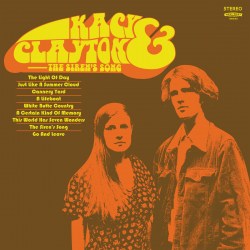Wrapping up another year in Canadian music, the 2018 Polaris Music Prize was awarded to New Brunswick-based Jeremy Dutcher for his debut album Wolastoqiyik Lintuwakonawa. Dutcher’s independent release is a synthesis of classical composition and traditional songs in the Wolastoq language.

Jeremy Dutcher’s, Wolastoqiyik Lintuwakonawa.
The album was inspired by Dutcher’s academic research in musicology at Dalhousie and features samples of wax-cylinder recordings from the Canadian Museum of Civilization. Past Polaris Prize winners have included Lido Pimienta in 2017, Kaytranada in 2016, Buffy Sainte-Marie in 2015 and Tanya Tagaq in 2014.
The Polaris Prize is self-described as “a not-for-profit organization that annually honours and rewards artists who produce Canadian music albums of distinction.” Apparently, very few of these albums came from anywhere west of Ontario. The only artist from Western Canada to make the shortlist in 2018 was the Snotty Nose Rez Kids, from Vancouver, with their LP The Average Savage — a political, thoughtful and proudly Indigenous collection of bangers.
Another recognizable name on the shortlist was the Toronto-based indie-pop band Alvvays, who played Louis’ Pub at the University of Saskatchewan last spring while touring their sophomore LP Antisocialites. Their debut self-titled record was also shortlisted in 2015. Notably, Alvvays was unable to attend the gala this year and sent a young band from the Toronto Girls Rock organization in their place.
The long list represented the West marginally better, including folk-duo Kacy & Clayton from Wood Mountain, Sask. The Siren’s Song is their third major release and represents a slight departure from their typically rootsy, pared-down instrumentation, featuring production work from Jeff Tweedy, of Wilco fame. Kacy & Clayton had this to say about their nomination:

Kacy & Clayton’s The Siren Song.
“We were very excited to be included on the long list. It seems like people in Canada are paying attention to us, which feels like a reward for our frequent touring.”
Edmonton’s psych-indie outfit Faith Healer also made the long list on the back of their 2017 release Try 😉. Faith Healer played the Capitol Music Club in Saskatoon on Sept. 10, 2017.
Nominations for the Polaris Prize are based on jury selection, and jurors are selected from the most well-known or acclaimed journalists and media personnel in Canada. This jury, or “203-headed Hydra,” as it was described by Globe and Mail writer Carly Lewis, has been a subject of controversy in the past few years.
In 2015, Canadaland published an article titled “I Was a Polaris Juror, and It Sucked,” which detailed juror Johnnie Regalado’s personal experiences as part of the selection process. These experiences included disrespectful online conduct, a minority of voices — mainly male — dominating the majority of discussion and a lack of diversity in both jury personnel and selection.
“Beyond the toxic culture of the discussion, I think the fact that so many jurors come from music media outlets like CBC and Exclaim! skews the results to a white, male, Toronto indie-rock sensibility,” Regalado wrote.
The annual Polaris gala has also been subject to criticism, most notably — and harshly — by 2013 prize recipients Godspeed You! Black Emperor in a statement made through their record label:
“Holding a gala during a time of austerity and normalized decline is a weird thing to do… If the point of this prize and party is acknowledging music-labor performed in the name of something other than quick money, well then maybe the next celebration should happen in a cruddier hall, without the corporate banners and culture overlords.”
The band pledged their prize money towards a music-education and instrument-supply program for prison inmates in Quebec.
For all its alleged shortcomings, the Polaris long list still recognizes and publicizes otherwise lesser-known artists and their work, which can only be a good thing — even if most of these artists unfortunately happen to be Torontonian indie boys.
—
Adam Swalm
Leave a Reply